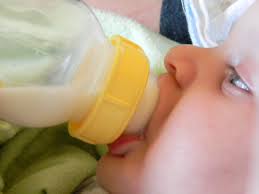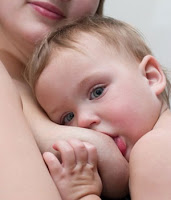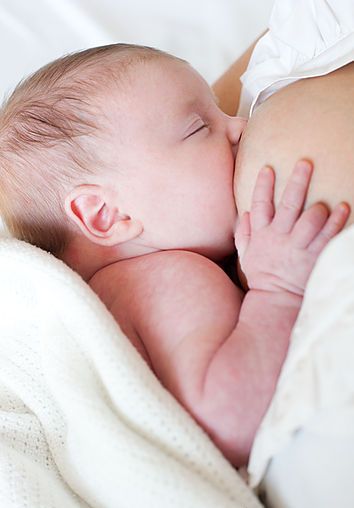Exclusive pumping is becoming more popular among American Moms, often seen as a way Moms can “have it all.” Meanwhile, the effects on Maternal and infant health—and workplace policies—are rarely discussed.
A serious pregnancy complication sent first-time mom Missy Boss into an emergency cesarean section; by the time she delivered, her blood pressure was at pre-stroke levels. Boss says since she didn’t have the all-natural, drug-free childbirth she’d planned, she was “determined to do at least one thing right: breastfeed.”
In the 56 hours after coming home from the hospital with her son, Boss never slept. Her son wouldn’t nurse. She spent one entire eight-hour stretch just trying to get him to latch onto her breast, but he wasn’t having it. She’d had as many lactation consultant visits as her insurance would cover and couldn’t afford the $600 per visit after that. “I already felt like a failure as a Mother in so many ways,” Boss says. “Could I do nothing right?”
There’s an assumption that bottle-feeding breast milk to a child is equivalent to breastfeeding, but that may not be the case.
When she told her Doula (who she didn’t end up needing at the birth) about how much trouble she was having breastfeeding, she told Boss that she had experienced similar problems with her first child, and ended up exclusively pumping her breast milk for two years. Missy decided to give it a try.
More specifically, “While expressed breast milk is recognized as far superior to infant formula, the Lactation community has begun to question whether [it] confers similar protection to that derived by directly breastfeeding,” according to Donna Chapman, writing in the Journal of Human Lactation. Such protections include reducing the incidence of gastrointestinal illnesses, upper respiratory infections, asthma, obesity, both types of diabetes, and certain childhood cancers.
Breastfeeding is about more than the milk. Babies don’t just breastfeed for nutrition; they nurse for comfort, closeness, soothing, and security.
Part of the problem is a lack of research. A 2013 systematic review of literature on the subject by researchers at the Royal Women’s Hospital in Victoria, Australia, found only 22 research papers addressing breast milk expression. Most papers discussed expression for sick or premature infants; the rest were commentaries calling for more research. With only seven papers reporting on expression by mothers of healthy, full-term infants, the authors concluded that there is “limited evidence” on the outcomes of the practice—and some studies resulted in contradictory results. Compounding the inconsistencies is that “breastfeeding was the term used to describe any breast milk intake, regardless of the mode of its delivery.” Since pumping has become more popular, studies should make a distinction between direct breastfeeding and feeding a baby breast milk from the bottle, the authors write.
“Promotion of breast-milk feeding as identical to breastfeeding is misleading,” says Virginia Thorley, a lactation consultant and honorary research fellow at the University of Queensland in Australia. “The new challenge is to use language accurately, and tell mothers the truth that feeding their milk to their babies by bottle is less than equivalent to breastfeeding.”
Thorley has written extensively on the potential perils of “normalizing” the separation of breast milk from breasts. She says that bottle-feeding of breast milk has a place in specific circumstances, such as when a baby is unable to adequately stimulate the mother’s milk supply, or in cases like Boss’, where a baby is unable to nurse directly. And while she agrees bottled breast milk is better than infant formula, “breastfeeding is about more than the milk.”
Babies don’t just breastfeed for nutrition; they nurse for comfort, closeness, soothing, and security.
Boss admits that, at first, she was worried about missing out on some of the benefits that breastfeeding ensures: the bonding, the closeness, the skin-to-skin contact. “But then I realized that parents can bond with their children in so many other ways,” she says. “Breastfeeding is just one thing of many that we can do to make sure our children know we love them and care about them.”
DESPITE THE NEED FOR additional research, current studies point to several problematic aspects of exclusive pumping. One concern is that babies only fed by bottle eat more and thus grow differently. A 2010 analysis shows that babies fed breast milk by bottle in early infancy were more likely to empty their bottles later in infancy than their breastfeeding counterparts. Infants fed both at the breast and with bottles of expressed breast milk gained weight at a similar rate to those only breastfed, but infants gained more weight per month when fed only by bottle (formula or breast milk).
There are multiple theories for why: Babies can get milk out of bottles quicker than breasts, caregivers tend to encourage infants to finish their bottles, and it is thought that breastfeeding teaches babies when to stop eating.
The underlying message [is] that milk expressing is incidental to her real work and her real life, as an employee. The elephant in the room is the deplorable lack of paid Maternity leave.
Another analysis found that infants who were not directly breastfed have a significant increase in coughing and wheezing episodes compared to those who were. Some research suggests storing expressed breast milk may interfere with its beneficial properties. Freezing can break down its immunological cells and lipids (but doesn’t affect its antimicrobial proteins), refrigeration reduces ascorbic acid concentrations, and both storage methods reduce antioxidant activity. Microwave thawing, which is not recommended, drastically decreases breast milk’s anti-infective elements. The effects of these changes, if any, are unknown.
The content of the breast milk itself may differ when it is exclusively pumped. A Mother’s breast milk changes according to a baby’s needs, as it ages, as well as throughout the course of a day and the course of each feeding session. Research has confirmed that the fat concentration of expressed milk increases with the baby’s age in the same way that breast-fed milk does. But if Mothers don’t pump for long enough at each session, their infants may receive predominantly fore milk (which is high in carbohydrates) and not get enough hind milk (which is high in fat).
As for contamination, everything breast milk touches outside the body during the process of expression and bottle-feeding is a chance for it to obtain harmful bacteria. Bacterial counts are higher in milk expressed with a pump than in milk expressed by hand.
Thorley adds that breastfeeding protects against ear infections not just because of breast milk’s anti-infective elements, but because of the posture of the baby’s head and the dynamics of the suck/swallow/breathe cycle while nursing. She says babies fed by bottle miss out on these aspects.
And we haven’t even addressed the potential health impacts for Mothers. We don’t know if pumping breast milk offers moms the same benefits of breastfeeding, such as increased postpartum weight loss, and reduced risk of postpartum depression, multiple reproductive cancers, rheumatoid arthritis, osteoporosis, Type 2 diabetes, heart disease, and high blood pressure.
BOSS TOLD ME THAT many people assume Mothers who pump exclusively are doing so out of convenience, rather than necessity or utter desperation: “Moms frequently feel attacked and criticized by friends, family, Internet strangers, etc. Everyone seems to think that EPing is a lifestyle choice, done for convenience.” Exclusive pumping is a lot of work; it can’t be a decision moms take lightly.
Whether it counts under “necessary” or “for convenience” is debatable, but one of the more controversial aspects of the exclusive pumping debate is that many working Mothers are adopting the practice. As Jill Lepore noted in a 2009 New Yorker article: “To follow a doctor’s orders, a woman who returns to work 12 weeks after childbirth has to find a way to feed her baby her own milk for another nine months. The nation suffers, in short, from a Human Milk Gap.
There are three ways to bridge that gap: longer maternity leaves, on-site infant childcare, and pumps. Much effort has been spent implementing option No. 3, the cheap way out.”
Judging by the Massachusetts Institute of Technology’s September hack-a-thon to “make the breast pump not suck,” we appear to have chosen pumping as the answer. The hack-a-thon winner was a utility-belt pump, designed for Moms who aren’t able to take breaks. CNN explained that: “Pumping while working means stopping all activity and heading to a secluded room for half an hour, multiple times a day. That loss of productivity is bad for employers and employees.”
Breast pumps are marketed as an essential accessory of modern Motherhood to wealthy countries with expendable income.
According to Thorley, pump harnesses that allow Mothers to work while pumping were already heavily promoted years ago: “The underlying message [is] that milk expressing is incidental to her real work and her real life, as an employee.
The elephant in the room is the deplorable lack of paid Maternity leave. I believe improving work conditions should be a high priority—not making fancier pumps.” All the well-intentioned advocates of better breast pumps and more access to lactation rooms should be aware that those policies actually promote more separation of Mom and baby, not less.
Breast pumps are marketed as an essential accessory of modern Motherhood to wealthy countries with expendable income, Thorley says, and she laments the death of the art of hand expressing breast milk. She takes issue with exclusive pumping becoming a life “choice,” and is concerned about the feeding of expressed milk shifting from something needed in relatively few circumstances to the norm.
The normalization of exclusive pumping could have major societal implications: It may erode societal support for Breastfeeding, for example. There’s also a danger that Moms will go straight for the pump and never even attempt to breastfeed their babies, and that the availability of efficient pumps will make it more difficult to argue for the importance of legislated Maternity Leave. Pumping may simply be too burdensome an activity—yet another expectation—to add to a Mother’s already complex life. As Thorley puts it: “More work for tired Mothers.”
FOR THE FIRST FEW weeks of exclusive pumping, Boss says she was lucky to get two hours of sleep a night. Her initial goal was to pump milk for her son for three months. Three months came and went, and she realized it really wasn’t that hard once she got used to it—even though she was pumping 12 times a day. “I got really efficient at it. I would just sit here at the kitchen table, pumping milk and catching up on Game of Thrones at 2 a.m.,” Boss tells me. “I read every book while pumping in the middle of the night.” Her next goal was six months. Six months came and went; now that her son is 14 months old, she is finally putting the pump away. She estimates that she has pumped a total of 2,300 times.
The three infant-feeding options available—formula, pumped breast milk, and breastfeeding—likely fall on a continuum of good, better, best. Many parents end up using the feeding method their baby or situation dictates (baby refuses bottles, can’t latch on breast, or has a bad reaction to formula; mom must return to work quickly, etc.). For parents who have the luxury of truly choosing any feeding method, it’s fine to choose exclusive pumping in the same way that it’s fine to choose formula, as long as they understand the differences in health outcomes.
The problem is that for exclusively pumped milk, Moms need to understand there’s still a lot we don’t know.
“I feel like I both succeeded and failed. Many Moms can’t or won’t exclusively pump for as long as I did, but I still feel like I failed at breastfeeding,” Boss says. “I realize I did the best that I could. And that’s all our kids can ask from us.”
Olivia Campbell
Nov 17, 2014






